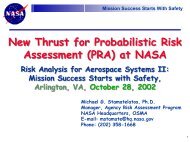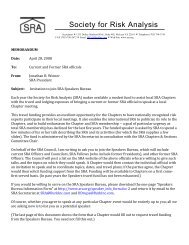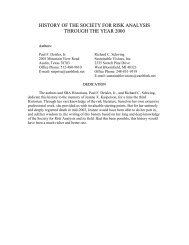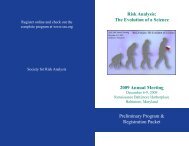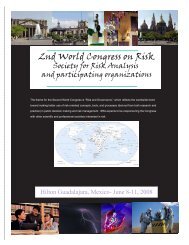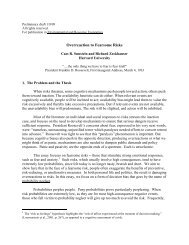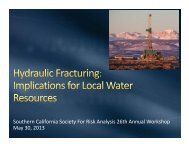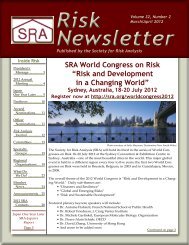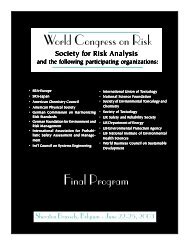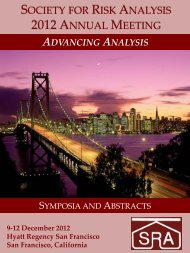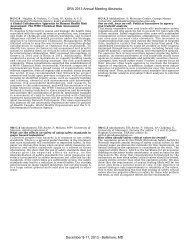T4-F.2 Smith MC, Rocks SA, Pollard SJT; mark.smith@cranfield.ac.ukCranfield UniversityLOCAL RISKS, STRATEGIC CONSEQUENCES; IMPROVING RISKMANAGEMENT IN UK LOCAL GOVERNMENTOrganisations cannot prevent every risk from occurring, and must instead prioritisetheir responses on hazards by either prevention, managing them to an acceptedlevel or by tolerating them. Such decisions are based on the skills and knowledge ofindividual decision makers and also past experiences, and these are gained throughlearning processes. Local authorities in the UK have difficulty defining their risk appetitebecause of the diverse range of hazards they are responsible <strong>for</strong> managing,everything from preventing child abuse to responding to severe weather events (1).Subsequently, while some risks can be accepted others cannot, and this can makeit difficult to establish lessons. These challenges are further complicated by shiftinginstitutional architecture which looks to decentralise power to communities, whilebudgets are reduced (2). These circumstances present an opportunity to review pastpractices and to develop more effective solutions. This research demonstrates thecommonalities between the tensions and range of challenges within one sector in theUK, and the potential methods by which they can be addressed. A series of targetedinterviews (n=16) with a range of individuals who are employed to deal with riskhave been coded and used to identify a series of common themes, including learning,process, and trusted judgement. The identified themes were then investigated, usingpublished and grey literature, expert input and practionner interviews to develop anunderstanding of the tensions and methods <strong>for</strong> addressing them within this sector,and the potential application within a wider range of sectors. 1) Byrne, T. (2000)Local Government in Britain: Everyone’s Guide to how it all Works, 7th edition, Penguin,London 2) HM Government, (2010) Decentralisation and the Localism Bill:an essential guide, Communities and Local Government, LondonW4-H.4 Snekkenes E; einar.snekkenes@hig.noGjovik University College, NorwayGAME THEORETICAL RISK MANAGEMENT<strong>Risk</strong> management within in<strong>for</strong>mation security (e.g. ISO 27005) usually mandatesthat experts identify threats, vulnerabilities, consequences and liklyhood. Inthe domain of in<strong>for</strong>mation security, one usually assumes an active and potentiallyadaptive adversary. However, these methods very rarely mandates that the risk analystclarifies his underlying assumptions relative to factors that are critical when predictingthe liklyhood of future incidents. In practice, it appears to be the case that liklyhoodestimates are based on traces of historic events such as incident logs. As highlightedby Taleb in his book The Black Swan, history is not always a good teacher when itcomes to identifying catastrophic events. We suggest that we need to re-think whatkind of data to use when predicting the liklyhood of incidents. Rather than asking176experts about the liklyhood of various events, one should instead ask (potentially differentexperts) questions such as- Who are the stakeholders, What incentives do thestakeholders have? How do the stakeholders value the various outcomes/potentialincidents? What kind of in<strong>for</strong>mation is available to the various stakeholders? Whatdecision strategies do the various stakeholders employ? We claim that if one is focusingon these issues rather than the direct elicitation of liklyhood guesses, one will bebetter equiped <strong>for</strong> identifying, preparing <strong>for</strong> and handling disasterous events - that <strong>for</strong>other stakeholders might be highly desirable. To adress this, we present a framework<strong>for</strong> integrating game theoretic concepts into a classical risk management approach.We suggest that this approach provides benefits even if no equilibria are computedand that the benefits come from the fact that the game theoretic perspective <strong>for</strong>cesthe risk analyst to identify and consider factors that are essential when predicting theactions of an inteligent and adaptive adversary.P.5 Stasiewicz M, Martin N, Laue S, Wiedmann M; ms984@cornell.eduCornell UniversityINCREASING THE TEMPERATURE OF HIGH TEMPERATURE,SHORT TIME PASTEURIZATION MAY INCREASE THE RISK OF LIS-TERIOSIS FROM CONSUMPTION OF PASTEURIZED FLUID MILKWhile adequate pasteurization is critical to the safety and quality of fluid milk,previous research has suggested that modest increases above the minimum high-temperatureshort-time pasteurization temperature (72 o C <strong>for</strong> 15 s) can increase the subsequentoutgrowth of bacteria during refrigerated storage of milk. This study evaluatedhow an increase in pasteurization temperature from 72 o C to 82 o C affected growthof Listeria monocytogenes, a foodborne pathogen eliminated with proper pasteurizationbut of concern when milk is contaminated post-pasteurization. 12 8-gallonsamples of raw milk were collected from the same dairy farm over 24 months, splitand pasteurized <strong>for</strong> 25 s at 72 o C or 82 o C; after cooling milk was inoculated with L.monocytogenes and stored at 6 o C <strong>for</strong> 24 d <strong>for</strong> enumeration. Overall, milk pasteurizedat 82 o C showed greater L. monocytogenes growth, specifically (i) lag phase decreasedby 2.5 d (from 4.4 to 1.9 d, p
and 95th percentiles). Increasing the pasteurization temperature of milk may modestlyincrease the incidence of listeriosis caused by fluid milk consumption.P.89 Steinhardt JS, Scherer CW, Buckingham JL, Kermis AD, Klopp AL,Kubli KA, Ross E; jss399@cornell.eduCornell UniversityIN GOOGLE WE TRUST: PRESENTATION AND INFORMATIONSEEKING OF UNCERTAIN INFORMATION ABOUT THE 2011 JAPANNUCLEAR CRISISUsing the 2011 Japanese earthquake-tsunami as a focal point, this two part exploratorystudy examines 1) how individuals seek risk in<strong>for</strong>mation and assess credibilityin sources online, and 2) how uncertain risk in<strong>for</strong>mation is presented in newsstories and blogs on the internet. Through observation followed by qualitative interviewswith students at a large university the research explores the process of seekingin<strong>for</strong>mation about the Fukushima 1 nuclear accidents and their impact on localfood safety as well as about the risks of building new domestic nuclear power plants.Participants were asked to evaluate these risks using any online sources available. Weconclude that students place a significant amount of trust in search engines as gatekeepersand believe that if a source comes up early in search results it is credible.Students believe that large corporations such as The New York Times and CNN havemore at stake if they report inaccurate in<strong>for</strong>mation and place trust in their stories.Websites that students have not previously encountered and ones that they believeare poorly designed are also viewed as less credible. To better understand how uncertainrisk in<strong>for</strong>mation is presented, and what sources in<strong>for</strong>mation seekers could beaccessing, a sample of news stories from CNN, NPR, New York Times, and selectedblogs were analyzed. Stories were selected which discussed how nuclear contaminationin Japan was impacting food safety there and the United States. In general, weconclude that there is uncertainty in almost all of the content; however, many of thearticles make their claims with certainty. Very few articles actually contain scientificsources, however, almost all of the articles make scientific claims. Mainly these arethrough political sources. Other times, articles just make use of the words “officials,experts, and authorities.” Most articles represent two viewpoints (often: safe vs. unsafe),but stress one side or the other.W4-C.3 Steinzor R, Shudtz M; rsteinzor @ law.umaryland.eduUniversity of Maryland School of Law and the Center <strong>for</strong> Progressive Re<strong>for</strong>mCORRECTIVE LENSES FOR IRISOver the last six years, the Center <strong>for</strong> Progressive Re<strong>for</strong>m (CPR) has publisheda series of white papers about EPA’s Integrated <strong>Risk</strong> In<strong>for</strong>mation System. While supportiveof the program’s high quality of work, CPR’s papers are critical of the speedwith which new IRIS profiles are completed and old profiles are updated, the gapsin the database from the perspective of the public health advocacy community, andthe review processes employed by the agency. We have proposed several re<strong>for</strong>ms tothe IRIS program that could eliminate data gaps and speed the assessment process.They include aligning the IRIS agenda with regulatory agendas in EPA’s air toxics anddrinking water programs, developing environmental-justice-based criteria <strong>for</strong> selectingchemicals to review, and streamlining all outside review of draft IRIS profilesinto a single stage. This presentation will cover CPR’s proposed re<strong>for</strong>ms, as well asnew research about differences in the degree of participation in the IRIS processby potentially regulated parties versus the potential beneficiaries of health-protectiveregulation. CPR’s research generally, and our work on IRIS in particular, present across-disciplinary perspective on risk-based regulation.T4-I.3 Stiefel D, Tonn B; btonn@utk.eduUniversity of Tennessee, KnoxvilleASSESSMENT OF METHODS FOR ESTIMATING EXISTENTIALRISKS: PART IIThis presentation focuses on four ‘model’-based methods that one could use toestimate existential risks. The term ‘model’ is being used emphasize that the approachcontains a method <strong>for</strong> structuring how multiple factors interact with each other in acausal fashion that ultimately could lead to human extinction. The most establishedmethod to be discussed is known as Bayesian networks. Three other innovative methodsare also considered: influence modeling based on environmental scans; simpleelicitation using human extinction scenarios as anchors; and computationally intensivepossible worlds modeling. The four methods are also assessed about how well theapproach describes causal relationships between events that could lead to human extinction;level of elicitation ef<strong>for</strong>ts required of experts; ease of approach implementation;transparency of inputs into risk estimates; and acceptability of the approach.P.17 Streetman SS; steven.streetman@dataarchitecturesolution.comData Architecture Solutions, Inc., DHSENSURING CONSISTENCY IN RISK ANALYSIS EVENT TREES ANDCONSEQUENCES<strong>Risk</strong> is often evaluated by constructing event trees and estimating consequences<strong>for</strong> the scenarios built by the trees. This process is intended to construct a spanningset of scenarios that captures the risk <strong>for</strong> the scope of the assessment. In practice, it iseasy to overlook important sub-events that significantly impact the relative likelihoodand/or the relative risk of the scenarios. It is also common to estimate consequences<strong>for</strong> different types of scenarios using disparate models that may not be equivalentlyconservative and, thus, may skew the risk results, sometimes by multiple orders ofmagnitude - especially <strong>for</strong> rare and highly consequential events like terrorist attacks.The impact of inconsistency in event trees and consequence assessments tends togrow in severity and importance as the scope of the risk assessment broadens. In thistalk we will present notional examples of terrorism risk assessments where relative177
- Page 4 and 5:
Ballroom C1Monday10:30 AM-NoonM2-A
- Page 9 and 10:
US Environmental Protection Agency
- Page 11 and 12:
Workshops - Sunday, December 4Full
- Page 13 and 14:
WK9: Eliciting Judgments to Inform
- Page 15 and 16:
These freely available tools apply
- Page 17 and 18:
Plenary SessionsAll Plenary Session
- Page 19 and 20:
10:30 AM-NoonRoom 8/9M2-F Panel Dis
- Page 21 and 22:
1:30-3:00 PMRoom 8/9M3-F Symposium:
- Page 23 and 24:
4:50 pm M4-E.5Modeling of landscape
- Page 25 and 26:
P.35 Health risk assessment of meta
- Page 27 and 28:
Works-In-ProgressP.99 Assessing the
- Page 29 and 30:
10:30 AM-NoonRoom 8/9T2-F Error in
- Page 31 and 32:
1:30-3:00 PMRoom 8/9T3-F AppliedMet
- Page 34 and 35:
8:30-10:00 AMBallroom C1W1-A Sympos
- Page 36 and 37:
10:30 AM-NoonBallroom C1W2-A Commun
- Page 38:
1:30-3:00 PMBallroom C1W3-A Communi
- Page 41 and 42:
3:30-4:30 PMRoom 8/9W4-F Environmen
- Page 43 and 44:
oth recent advances, and ongoing ch
- Page 45 and 46:
M3-H Symposium: Analyzing and Manag
- Page 47 and 48:
Part 2, we consider the use of expe
- Page 49 and 50:
T4-E Symposium: Food Safety Risk Pr
- Page 51 and 52:
While integral to guiding the devel
- Page 53 and 54:
have contributed to past difficulti
- Page 55 and 56:
M2-C.1 Abraham IM, Henry S; abraham
- Page 58 and 59:
serious accident of the Tokyo Elect
- Page 60 and 61:
een found that independence assumpt
- Page 62 and 63:
W4-I.1 Beach RH, McCarl BA, Ohrel S
- Page 64 and 65:
M4-A.1 Berube DM; dmberube@ncsu.edu
- Page 66 and 67:
W4-A.1 Boerner FU, Jardine C, Dried
- Page 69 and 70:
M2-G.1 Brink SA, Davidson RA; rdavi
- Page 71 and 72:
M4-H.5 Buede DM, Ezell BC, Guikema
- Page 73 and 74:
same scientists’ environmental he
- Page 75 and 76:
periods of time. Successful adaptat
- Page 77 and 78:
P.123 Charnley G, Melnikov F, Beck
- Page 79 and 80:
derived from mouse and rat testes t
- Page 81 and 82:
esources under any circumstance in
- Page 83 and 84:
W4-B.3 Convertino M, Collier ZA, Va
- Page 85 and 86:
addition, over 10% thought that eve
- Page 87 and 88:
Reference Dose (RfD). The average e
- Page 89 and 90:
W2-H.2 Demuth JL, Morss RE, Morrow
- Page 91 and 92:
T4-H.4 Dingus CA, McMillan NJ, Born
- Page 93 and 94:
methods research priorities and pot
- Page 95 and 96:
W3-A.2 Eggers SL, Thorne SL, Sousa
- Page 97 and 98:
tions) were < 1 for sub-populations
- Page 99 and 100:
sociated with model error. Second,
- Page 101 and 102:
inter-donation interval to mitigate
- Page 103 and 104:
Fukushima nuclear accident coverage
- Page 105 and 106:
for growth inhibitor use and retail
- Page 107 and 108:
W1-C.1 Goble R, Hattis D; rgoble@cl
- Page 109 and 110:
stakeholders. The utility of this m
- Page 111 and 112:
T2-E.4 Guidotti TL; tee.guidotti@gm
- Page 113 and 114:
M4-C.2 Haines DA, Murray JL, Donald
- Page 115 and 116:
providing normative information of
- Page 117 and 118:
then allow both systems to operate
- Page 119 and 120:
tious disease outbreaks. Several cl
- Page 121 and 122:
P.122 Hosseinali Mirza V, de Marcel
- Page 123 and 124:
W2-B.1 Isukapalli SS, Brinkerhoff C
- Page 125 and 126:
M3-G.3 Jardine CG, Driedger SM, Fur
- Page 127 and 128: P.88 Johnson BB, Cuite C, Hallman W
- Page 129 and 130: metrics to provide risk management
- Page 131 and 132: M4-C.1 Koch HM, Angerer J; koch@ipa
- Page 133 and 134: certainty factors) and comparative
- Page 135 and 136: T3-D.4 LaRocca S, Guikema SD, Cole
- Page 137 and 138: P.71 Lemus-Martinez C, Lemyre L, Pi
- Page 139 and 140: of excretion, and the increased che
- Page 141 and 142: M2-D.4 MacKenzie CA, Barker K; cmac
- Page 143 and 144: isk appetite and optimal risk mitig
- Page 145 and 146: ameters, and enabled a more robust
- Page 147 and 148: over the nature and format of infor
- Page 149 and 150: Analysis (PRA). Existing parametric
- Page 151 and 152: explosion of a bomb in a building,
- Page 153 and 154: T3-G.3 Nascarella MA; mnascarella@g
- Page 155 and 156: corresponding slowdown in container
- Page 157 and 158: ing the scope and usage of the cybe
- Page 159 and 160: dose for a variety of exposure scen
- Page 161 and 162: “nanofibers”) is relatively und
- Page 163 and 164: ment (CEA), which provides both a f
- Page 165 and 166: T3-D.2 Resurreccion JZ, Santos JR;
- Page 167 and 168: shore wind turbines have yet been b
- Page 169 and 170: T2-D.3 Rypinski AD, Cantral R; Arth
- Page 171 and 172: time and temperature, determining t
- Page 173 and 174: esponse to requests from the EC, th
- Page 175 and 176: ers and inspectors. Analysis examin
- Page 177: smoked salmon, and associated expos
- Page 181 and 182: esponse relationship for B. anthrac
- Page 183 and 184: variation on Day 0. Results showed
- Page 185 and 186: sidered. The most significant resul
- Page 187 and 188: lived in a apartment (not including
- Page 189 and 190: W3-C.4 von Stackelberg KE; kvon@eri
- Page 191 and 192: P.12 Waller RR, Dinis MF; rw@protec
- Page 193 and 194: W2-B.6 Wang D, Collier Z, Mitchell-
- Page 195 and 196: iomonitoring “equivalent” level
- Page 197 and 198: T4-H.2 Winkel D, Good K, VonNiederh
- Page 199 and 200: mation insufficiency, risk percepti
- Page 201 and 202: choices. This work examines these s
- Page 203 and 204: sults and possible intended or unin
- Page 205 and 206: AAbadin HG.................... 36,
- Page 207 and 208: Gray GM............................
- Page 209 and 210: Peters E...........................
- Page 211 and 212: SECOND FLOOR Floor MapConvention Ce



